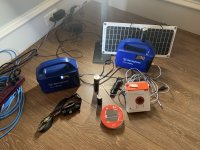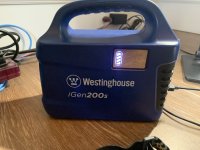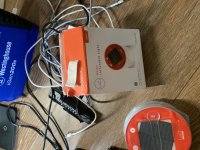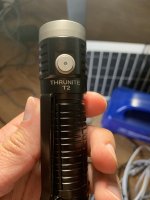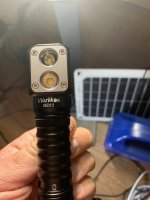You are using an out of date browser. It may not display this or other websites correctly.
You should upgrade or use an alternative browser.
You should upgrade or use an alternative browser.
My power outage/ balck out kit
- Thread starter Flashlightmaster2021
- Start date
 Help Support Candle Power Flashlight Forum
Help Support Candle Power Flashlight Forum
The den blackout kit.
Flashlightmaster2021
Newly Enlightened
haha thats hi
That`s a lot flash lights. Nice work !!
lol lol that is hilarious !! what about back up power ? do you have any portable power stations or home generator ?
That`s a lot flash lights. Nice work !!
That's awesome. It almost looks like a pagan altar. But the Jesus pic saves you.😉
I have some options as well - not as many as Bykfixer, but more than enough for just about any power outage.
The ones that got the most use during a recent outage were a pair of ML25 Maglites.

With adapters, I can run these on an assortment of different cell "fuel" flavors.

and I can turn them into lanterns for area light.

A few others also got pressed into lantern duty, lighting up different parts of the house where needed.
The ones that got the most use during a recent outage were a pair of ML25 Maglites.
With adapters, I can run these on an assortment of different cell "fuel" flavors.
and I can turn them into lanterns for area light.
A few others also got pressed into lantern duty, lighting up different parts of the house where needed.
Flashlightmaster2021
Newly Enlightened
thats pretty neat. do you have a any power banks/ portable power stations ?I have some options as well - not as many as Bykfixer, but more than enough for just about any power outage.
The ones that got the most use during a recent outage were a pair of ML25 Maglites.
View attachment 25459
With adapters, I can run these on an assortment of different cell "fuel" flavors.
View attachment 25460
and I can turn them into lanterns for area light.
View attachment 25461
A few others also got pressed into lantern duty, lighting up different parts of the house where needed.
I just live like they did back in Jefferson's day. And a natural gas stove ensures Mrs Fixer has coffee.haha thats hi
lol lol that is hilarious !! what about back up power ? do you have any portable power stations or home generator ?
Oh and I have several power banks to make sure I can stay tuned to CPF via my iPhone.
When it comes to blackouts, most if not all of the members here are fairly well prepared. Personally I have more lights than I need, for myself and a dozen of my neighbors. I don't have as many as bykfixer, that isn't his entire collection. I probably have multiple rechargeable batteries for each of the lights I have, (at least some of them) and chargers that can be powered from AC, a car 12V power output, or power banks. I have a lights, a fan and a radio that will run on Ryobi 18V plus one batteries, plus of course the tools they were designed for. 18V circular saw, sawzall, and drill driver.
I do have two generators, a 2000 watt, and a 3500 watt predator super quiet inverter generators.
One of the most important "Black out lights" IMO is one that is always plugged into an outlet, and comes on automatically when the power goes out. I have a few of them. When the power goes out, there is no immediate total darkness, instead it gives enough light so that there isn't panic. They also give enough light so that one can easily and safely travel to get his black out lights.
Here is a pic of one.

Here are some of my lanterns:

to be continued:
I do have two generators, a 2000 watt, and a 3500 watt predator super quiet inverter generators.
One of the most important "Black out lights" IMO is one that is always plugged into an outlet, and comes on automatically when the power goes out. I have a few of them. When the power goes out, there is no immediate total darkness, instead it gives enough light so that there isn't panic. They also give enough light so that one can easily and safely travel to get his black out lights.
Here is a pic of one.
Here are some of my lanterns:
to be continued:
I have a couple of chargers that can double as small power banks and jump starter that is also a power bank.thats pretty neat. do you have a any power banks/ portable power stations ?
Yep, me too.I have a couple of chargers that can double as small power banks and jump starter that is also a power bank.
Also the Ryobi 18V batteries can be used to charge other usb chargeable items. For example the radio has a usb output.
idleprocess
Flashaholic
I'm well set for a blackout:
- Numerous flashlights
- A handful of battery-powered worklights
- A stash of batteries
- Numerous powerbanks
- A half-dozen plus power tool batteries + bespoke inverter
- Many oil lanterns
- A ~gallon of lantern oil
- Candles
- Inverter generators + inlet + interlock breaker for backfeed
Flashlightmaster2021
Newly Enlightened
Now this is pro level ! nice
Last edited:
Hooked on Fenix
Flashlight Enthusiast
- Joined
- Dec 13, 2007
- Messages
- 3,649
Milwalkee 12 (400 lumen) and 18 volt (700 lumen) lanterns with usb charge port
Luci Lux Pro lantern- solar rechargeable warm white 135 lumen lantern with 2 amp battery and usb power bank
Nitecore magnetic lantern kit- 80 lumen lantern, battery charger/power bank, 5 amp 21700 li-ion battery
Nitecore HC60 v2 headlight, MH10 v2 flashlight, E4K (all usb-c rechargeable)
Nitecore electronic whistle/2000 lumen beacon- for emergencies where I need to be found.
Milwalkee Top Off inverter and plenty of 18 volt batteries to run it.
Goal Zero Nomad 7 solar chargers for charging small electronics.
Xtar PB2S 2 21700 li-ion charger/power bank and plenty of batteries
1600 watt Firman generator for running refrigerator or a.c.
45 watt solar panel connected to deep cycle battery and 400 watt true sine wave inverter for charging tool batteries (This stays running outside. Doesn't go in a kit.)
200 watt true sine wave inverter for car in case emergency requires leaving home. I live in the town where both the Cedar and Witch Creek fires started. Sometimes you have to bug out.
Hundreds of candles as a heat and light source and in case of c.m.e. or e.m.p.
lightsticks to use before candles so I don't burn the house down.
Hydralights- flashlights that run on water
Luminizer lanterns- uses a liquid candle to power a thermoelectric generator which powers l.e.d.s for a lantern
Midland am/fm/weather radio with solar and crank charging and a flashlight
Walkie talkies for communications when the cell tower batteries run out of juice or everyone calls 911 at once because the power is out. I have CBs, GMRS/FRS, and MURS radios.
Water filters- When our power goes out, water might not be treated correctly. Water may be shut off and you might have to get it from an untreated source. Kadydyn Hiker filters are good for removing chemicals. Sawyer Sweeze filters are best for mountain stream water. Steripens are good for killing viruses. Katadyn Pocket is best for longevity (13,000 gallons). Lifestraw Mission is great across the board. I like the MSR Trailshot for ease of cleaning. (With other hollow fiber filters, you need clean water left over to back flush the filter when it starts to clog. In the field, that will require another filter if you're out of water. With the Trailshot, you squeeze water into a plastic bubble, shake it, then remove the output hose to drain the water.)
First aid kit goes in the black out kit as well. People get hurt when they start stumbling around in the dark.
That's not everything but I think I covered the basics.
Luci Lux Pro lantern- solar rechargeable warm white 135 lumen lantern with 2 amp battery and usb power bank
Nitecore magnetic lantern kit- 80 lumen lantern, battery charger/power bank, 5 amp 21700 li-ion battery
Nitecore HC60 v2 headlight, MH10 v2 flashlight, E4K (all usb-c rechargeable)
Nitecore electronic whistle/2000 lumen beacon- for emergencies where I need to be found.
Milwalkee Top Off inverter and plenty of 18 volt batteries to run it.
Goal Zero Nomad 7 solar chargers for charging small electronics.
Xtar PB2S 2 21700 li-ion charger/power bank and plenty of batteries
1600 watt Firman generator for running refrigerator or a.c.
45 watt solar panel connected to deep cycle battery and 400 watt true sine wave inverter for charging tool batteries (This stays running outside. Doesn't go in a kit.)
200 watt true sine wave inverter for car in case emergency requires leaving home. I live in the town where both the Cedar and Witch Creek fires started. Sometimes you have to bug out.
Hundreds of candles as a heat and light source and in case of c.m.e. or e.m.p.
lightsticks to use before candles so I don't burn the house down.
Hydralights- flashlights that run on water
Luminizer lanterns- uses a liquid candle to power a thermoelectric generator which powers l.e.d.s for a lantern
Midland am/fm/weather radio with solar and crank charging and a flashlight
Walkie talkies for communications when the cell tower batteries run out of juice or everyone calls 911 at once because the power is out. I have CBs, GMRS/FRS, and MURS radios.
Water filters- When our power goes out, water might not be treated correctly. Water may be shut off and you might have to get it from an untreated source. Kadydyn Hiker filters are good for removing chemicals. Sawyer Sweeze filters are best for mountain stream water. Steripens are good for killing viruses. Katadyn Pocket is best for longevity (13,000 gallons). Lifestraw Mission is great across the board. I like the MSR Trailshot for ease of cleaning. (With other hollow fiber filters, you need clean water left over to back flush the filter when it starts to clog. In the field, that will require another filter if you're out of water. With the Trailshot, you squeeze water into a plastic bubble, shake it, then remove the output hose to drain the water.)
First aid kit goes in the black out kit as well. People get hurt when they start stumbling around in the dark.
That's not everything but I think I covered the basics.
Flashlightmaster2021
Newly Enlightened
Nice work !!Milwalkee 12 (400 lumen) and 18 volt (700 lumen) lanterns with usb charge port
Luci Lux Pro lantern- solar rechargeable warm white 135 lumen lantern with 2 amp battery and usb power bank
Nitecore magnetic lantern kit- 80 lumen lantern, battery charger/power bank, 5 amp 21700 li-ion battery
Nitecore HC60 v2 headlight, MH10 v2 flashlight, E4K (all usb-c rechargeable)
Nitecore electronic whistle/2000 lumen beacon- for emergencies where I need to be found.
Milwalkee Top Off inverter and plenty of 18 volt batteries to run it.
Goal Zero Nomad 7 solar chargers for charging small electronics.
Xtar PB2S 2 21700 li-ion charger/power bank and plenty of batteries
1600 watt Firman generator for running refrigerator or a.c.
45 watt solar panel connected to deep cycle battery and 400 watt true sine wave inverter for charging tool batteries (This stays running outside. Doesn't go in a kit.)
200 watt true sine wave inverter for car in case emergency requires leaving home. I live in the town where both the Cedar and Witch Creek fires started. Sometimes you have to bug out.
Hundreds of candles as a heat and light source and in case of c.m.e. or e.m.p.
lightsticks to use before candles so I don't burn the house down.
Hydralights- flashlights that run on water
Luminizer lanterns- uses a liquid candle to power a thermoelectric generator which powers l.e.d.s for a lantern
Midland am/fm/weather radio with solar and crank charging and a flashlight
Walkie talkies for communications when the cell tower batteries run out of juice or everyone calls 911 at once because the power is out. I have CBs, GMRS/FRS, and MURS radios.
Water filters- When our power goes out, water might not be treated correctly. Water may be shut off and you might have to get it from an untreated source. Kadydyn Hiker filters are good for removing chemicals. Sawyer Sweeze filters are best for mountain stream water. Steripens are good for killing viruses. Katadyn Pocket is best for longevity (13,000 gallons). Lifestraw Mission is great across the board. I like the MSR Trailshot for ease of cleaning. (With other hollow fiber filters, you need clean water left over to back flush the filter when it starts to clog. In the field, that will require another filter if you're out of water. With the Trailshot, you squeeze water into a plastic bubble, shake it, then remove the output hose to drain the water.)
First aid kit goes in the black out kit as well. People get hurt when they start stumbling around in the dark.
That's not everything but I think I covered the basics.
idleprocess
Flashaholic
Couldn't start to justify a whole-house generator for well under 10 hours per year of outages, but ~3.4kW of 120V isn't going to run the HVAC compressor either thus I might step it up to a ≥50A 120V/240V generator and install a soft-start mod on the HVAC compressor.[KOHLER]
These Absorbed Glass Mat (no topping off distilled water) golf cart sized batteries cost less than the generator setups some folks have (but solar panels, etc. are a significant initial expense). Wife and I put these in after the previous owner's flooded lead acid batteries flopped over from renter-neglect. The only blackouts we have is if somebody brings over their fainting goat. Excessive alcohol use is discouraged.

Good list HOF. Thoughts coming from one who actually had to bug out is meaningful.Milwalkee 12 (400 lumen) and 18 volt (700 lumen) lanterns with usb charge port
Luci Lux Pro lantern- solar rechargeable warm white 135 lumen lantern with 2 amp battery and usb power bank
Nitecore magnetic lantern kit- 80 lumen lantern, battery charger/power bank, 5 amp 21700 li-ion battery
Nitecore HC60 v2 headlight, MH10 v2 flashlight, E4K (all usb-c rechargeable)
Nitecore electronic whistle/2000 lumen beacon- for emergencies where I need to be found.
Milwalkee Top Off inverter and plenty of 18 volt batteries to run it.
Goal Zero Nomad 7 solar chargers for charging small electronics.
Xtar PB2S 2 21700 li-ion charger/power bank and plenty of batteries
1600 watt Firman generator for running refrigerator or a.c.
45 watt solar panel connected to deep cycle battery and 400 watt true sine wave inverter for charging tool batteries (This stays running outside. Doesn't go in a kit.)
200 watt true sine wave inverter for car in case emergency requires leaving home. I live in the town where both the Cedar and Witch Creek fires started. Sometimes you have to bug out.
Hundreds of candles as a heat and light source and in case of c.m.e. or e.m.p.
lightsticks to use before candles so I don't burn the house down.
Hydralights- flashlights that run on water
Luminizer lanterns- uses a liquid candle to power a thermoelectric generator which powers l.e.d.s for a lantern
Midland am/fm/weather radio with solar and crank charging and a flashlight
Walkie talkies for communications when the cell tower batteries run out of juice or everyone calls 911 at once because the power is out. I have CBs, GMRS/FRS, and MURS radios.
Water filters- When our power goes out, water might not be treated correctly. Water may be shut off and you might have to get it from an untreated source. Kadydyn Hiker filters are good for removing chemicals. Sawyer Sweeze filters are best for mountain stream water. Steripens are good for killing viruses. Katadyn Pocket is best for longevity (13,000 gallons). Lifestraw Mission is great across the board. I like the MSR Trailshot for ease of cleaning. (With other hollow fiber filters, you need clean water left over to back flush the filter when it starts to clog. In the field, that will require another filter if you're out of water. With the Trailshot, you squeeze water into a plastic bubble, shake it, then remove the output hose to drain the water.)
First aid kit goes in the black out kit as well. People get hurt when they start stumbling around in the dark.
That's not everything but I think I covered the basics.
I also have three working CBs, but only ONE antennae. One of them has a WRX weather radio in it.
Two of them are wired to a cigar lighter plug, for really quick installation. The working antennae is a K40 magnetic mount. I should get another.
The FRS walkie talkies sometimes work better than CBs on the road because there is so much cross-talk, and the users are trash talkers, not like it was way back when.
idleprocess
Flashaholic
Whole-house generators look to be about a 5-figure commitment once it's all said and done - generator + accessories + running materials + installation all add up. Aren't free to have sitting around either - monthly automatic tests and ~annual maintenance required for the warranty are part of the deal. And when they do run for an outage I gather that gas bill can be eye-watering. Also a bit hard to come by in my region thanks to February 2021.These Absorbed Glass Mat (no topping off distilled water) golf cart sized batteries cost less than the generator setups some folks have (but solar panels, etc. are a significant initial expense).
Seen a few paralleled 240V/120V generator setups out there backfeeding into the house that are cheaper than a whole-house but in the mid 4 figures range. They're pretty quiet and reasonably efficient across their power range.
Cheapest route for "whole house" backup looks to be a ~12kW running conventional fixed-RPM 240V/120V generator, which can be implemented turnkey to backfeed your house for perhaps close to the cost of that battery bank. And you're still going to have to live within the limits of 50A x 240V since L4-50 is about the beefiest outlet you can get in a (nominally) portable generator.
Of course for the portable generator route you're going to want a soft start for any HVAC compressors - another ~$500 to the bill. Fuel logistics gets to be a challenge when a 5-gallon jerry can lasts well short of 8 hours and even a 40 gallon propane tank lasts but a bit over 8 hours.
Thus I opted for a minimal setup - around $1500 all told and I can run WFH (Work From Home) 120V loads for about an entire workday on 2 gallons of gas. Two jerry cans should get me through almost a weeklong outage - probably longer if I go minimal with just the laptop and run one generator at a time rather than my entire power-hungry office setup.
If I had solar I'd consider a battery bank + inverter, although cost considerations would probably limit that to 120V circuits.
Similar threads
- Replies
- 2
- Views
- 424

